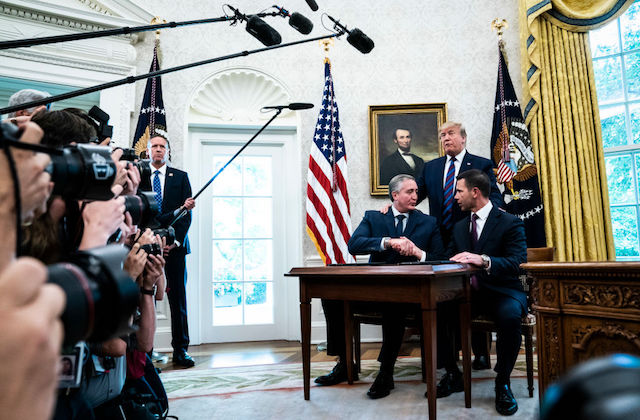Guatemala and U.S. Could Unleash Political Crisis With New Deal to Restrict Asylum

After engaging in secret negotiations, Guatemala and the United States signed a deal Friday (July 26) that will make it extremely difficult for Central Americans to claim asylum in the United States, The Washington Post reports. Known as a “safe third country agreement,” beginning in August of this year, migrants who have crossed through Guatemala, including Salvadorans and Hondurans, will be required to seek protection in Guatemala and will not be permitted to claim asylum in the U.S.
Guatemalan President Jimmy Morales was strong armed into signing the deal after the Trump administration threatened “severe penalties on Guatemala — tariffs, a travel ban or taxes on the billions of dollars in remittances sent home by migrants in the United States,” according to The Post. However, Morales’s compliance has been met with a huge backlash in his country. On Saturday (July 27), hundreds gathered to protest the agreement in front of the presidential palace in Guatemala City. Morales’s four-year term ends in January 2020, but protestors called for his resignation. Over the weekend, a top Twitter hashtag in the country was, “#Jimmyvendepatrias — Jimmy the sellout.”
The Post reports:
Guatemalan analysts have suggested Morales made the deal with Trump in hopes of winning support from the U.S. government. Morales faces allegations of financial crimes related to his 2015 electoral campaign but has been shielded by presidential immunity, which he loses in January. He says he is innocent.
Morales said the agreement would help Guatemala by “putting us in a privileged position” with the country’s top trading partner and most important ally.
The reality, according to The Post, is that the “safe third country” agreement stands on shoddy political grounds. The Guatemalan Constitutional Court ruled in early July that Morales couldn’t sign the accord without permission from Guatemalan Congress, which he never received. Renzo Rosal, an independent political consultant, told The Post, “This leaves a legacy we won’t be able to recover from, that the country’s constitution can be flagrantly violated without any kind of reaction or penalty.”
Immigration advocates in the U.S. are likely to challenge the agreement in the courts because they will argue Guatemala is plagued by extreme violence and doesn’t qualify as a “safe” country. Brenda Hernández, a human rights activist who helped organize the protest in Guatemala, told the Associated Press that it’s unreasonable to expect a poor country to manage a large influx of migrants. “Guatemala doesn’t have the capacity to be a safe country for migrants that aren’t desired in the United States,” she said.
According to The Post:
Human rights groups, Democratic lawmakers and immigration experts have said Guatemala is too poor and underdeveloped to handle a flood of asylum applicants. Last year, Salvadoran and Honduran migrants filed nearly 58,000 applications for asylum in the United States. That year, Guatemala received just 259 asylum applications overall.
Eric Schwartz, head of Refugees International, told The Post this pact could create a potentially dangerous situation. “[The agreement] would represent a grotesque violation of both U.S. law and human decency,” he said. “[It]” would put at risk the lives of thousands of Central Americans.”
